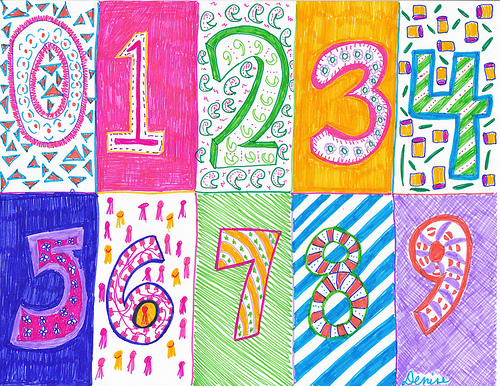
by mrsdkrebs under a CC license on Flickr
The Greek numbers are not too hard to learn. However, beginners find it hard to use them. The reason is that the numbers one, three and four are not invariable and are declined. They have three genders (masculine, feminine and neuter), cases , singular and plural. Number one has only singular and numbers three and four have only plural. When counting, we use the neuter: ένα, δύο, τρία. You can find more information on their declension in this pdf: enas-mia-ena
Below, there are examples of their use.
Ένας μία ένα
Ήπια μόνο έναν καφέ. (Ipia mono enan kafe) I drank only one coffee (lit.)
“Πόσες σοκολάτες έφαγες;” “Μία.” (Poses sokolates efages? Mia) “How many chocolates did you eat?” “One.”
Το μολύβι κάνει ένα ευρώ. (To molivi kani ena evro) The pencil costs one euro.
Note that the final -ν of the accusative έναν should not be omitted in order to distinguish the masculine from the neuter (έναν vs ένα). However, it is not always pronounced.
Τρεις, τρία / τέσσερις, τέσσερα
Έχω τρεις αδελφές. (Eho tris adelfes) I have three sisters.
Έχω τρεις αδελφούς. (Eho tris adelfous) I have three brothers.
Έχω τρία παιδιά. (Eho tria pedia) I have three children.
Ήπιαμε είκοσι τρεις μπίρες. (Ipiame ikositris bires) We drank twenty-three beers.
Πίνω τέσσερις καφέδες τη μέρα. (Pino teseris kafedes ti mera) I drink four coffees per day.
Χρειαζόμαστε τέσσερις καρέκλες ακόμα. (Hriazomaste teseris karekles akoma) We need four more chairs.
Το φάρμακο κάνει τέσσερα ευρώ. (To farmako kani tesera evro) The medicine costs four euros.
Αγόρασα μία οθόνη είκοσι τεσσάρων ιντσών. (Agorasa mia othoni ikosi tesaron intson) I bought a 24-inch monitor.
“Τι ώρα είναι;” “Τρεις και μισή”. (Ti ora ine? Tris ke misi) “What’s the time?” “Half past three.” (In this context, τρεις refers to the noun ώρες which is implied.)
When talking about someone’s age, we use the possessive case (γενική).
“Πόσων χρονών είσαι;”(Poson hronon ise) How old are you? (Literally, it means “of how many years are you?”)
“Δεκατεσσάρων.” (Dekatesaron) Fourteen. (Literally, it means “of fourteen”)
Η Σίλβια είναι είκοσι τριών χρονών. (I Silvia ine ikositrion hronon) Silvia is twenty-three years old.
Το μωρό είναι ενός χρόνου. (To moro ine enos hronou) the baby is one year old.

by Brett Jordan under a CC license on Flickr






